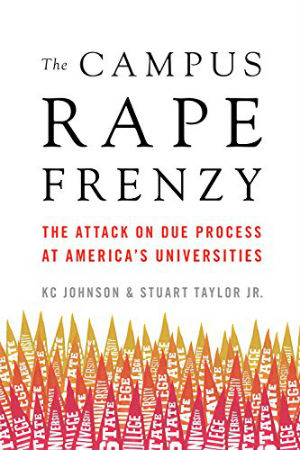
Pyrrhic victory for activist whose claims resembled those of ‘Jackie’
Her 2013 Title IX complaint against the University of North Carolina made Andrea Pino a celebrity in anti-rape activist circles.
She went on to co-found End Rape on Campus, star in The Hunting Ground and write a book that urges people to believe any and every rape claim without scrutiny.
Five years after that complaint, which “touched off a wave of similar actions by women against universities across the nation,” the Department of Education has found the university responsible for failing to “adopt and publish grievance procedures that provide for the prompt and equitable resolution” of sex-discrimination complaints, The News & Observer reports.
It’s something of a Pyrrhic victory for Pino and her co-complainants, including her End Rape on Campus co-founder Annie Clark.
The only clearcut violations came from 2011 through 2013, when “some UNC staff members were not adequately trained to implement the university’s own procedures” and recordkeeping was inadequate, making it difficult for the feds to assess compliance.
The university “generally” did fine investigating complaints from 2014 through 2016, though federal investigators expressed concern about how long many of the investigations took, according to the paper. UNC admitted no wrongdoing but agreed to “review and possibly revise” its procedures and submit to federal monitoring.
The resolution of the complaint stands to stir up unwanted scrutiny against Pino for her own rape claims, which were deemed suspicious in two separate investigations in the past two years.
 KC Johnson and Stuart Taylor identified several “implausible elements” in Pino’s story in their book The Campus Rape Frenzy (left) – inconsistencies and contradictions that advocates such as Pino urge investigators to see as evidence of their truthfulness.
KC Johnson and Stuart Taylor identified several “implausible elements” in Pino’s story in their book The Campus Rape Frenzy (left) – inconsistencies and contradictions that advocates such as Pino urge investigators to see as evidence of their truthfulness.
Pino claimed her attacker left her “severely injured and bleeding” at a UNC party, but no one noticed her injuries at the party or her dorm. She identified different people over the span of two years as the one person who called her “lazy” for academic problems she experienced after the incident. That disputed person either had full or zero knowledge of the incident, in her varying tellings.
She waited until after appearing in The Hunting Ground to claim she had been carrying a Taser during the incident.
Journalist Cathy Young found even more discrepancies in an investigation she started after Pino’s rise and resumed a year ago, namely her ability to bleed out unperturbed in a bathroom at a crowded party and clean up the bloody mess in her room undetected – all without passing out from blood loss.
Pino also alternately claimed the attacker was a fellow UNC student and a “total stranger,” and gave contrasting explanations for why she took so long to report the incident as a rape.
Young’s initial attempt to document Pino’s claims was “nearly impossible” because her account “lacks virtually all verifiable detail,” but they bear “striking similarities” to those told by the fabulist Jackie Coakley in Rolling Stone, according to Young. No one besides Young has apparently tried to investigate a second rape Pino claimed to have suffered at UNC, either.
Two years after Rolling Stone‘s disaster with Coakley, Young scolded the media for “still failing at basic fact-checking when it comes to claims of sexual assault—even when the stories have numerous red flags.”
There’s still time left for serious reporting on one of the most influential anti-rape activists in America, if only other journalists stop ignoring red flags and pursue truth instead of mythologies that teach alleged victims are infallible.
MORE: The next ‘Jackie’? Investigations poke holes in Pino’s story
IMAGE: Kirsten E. Gillibrand/YouTube
Like The College Fix on Facebook / Follow us on Twitter






Please join the conversation about our stories on Facebook, Twitter, Instagram, Reddit, MeWe, Rumble, Gab, Minds and Gettr.